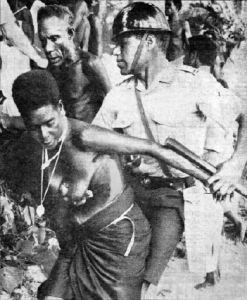A people impoverished and humiliated by Rio Tinto
Bougainville’s Sir Paul Lapun speaks out
On the 14th of April 1988, Sir Paul Lapun – the legendary MP for Bougainville (1964-77) who passed away in 2003 – sat down with Rio Tinto’s historian to talk about the great fraud forced upon his people, and the long struggle they have waged for justice and dignity.

In this interview, tucked away in the CRA** archives, Sir Paul talks of a once proud people made dependent on a rapacious mine owned by Rio Tinto, which they were told would be nothing more than ‘a big hole in the ground’ (p.23). He talks of rich soils poisoned by toxic tailings that had been pumped onto his people’s sacred lands and waterways. And he talks of a people not born poor, but made poor by the mine and its effects.
As a result of the Panguna mine, Sir Paul claims, there is now, ‘no fish – nothing! The Jaba River is all eroded, and still now the sea shore is becoming silted’ (p.15-6). He continues, ‘we used to get a lot of cocoa seeds … but now they don’t get those seeds’ owing to acid rain (p.17).
Sir Paul recalls having his grave concerns dismissed by national government representatives, get a scientist he was told. In a moment of defiance, Lapun testifies to local knowledge, ‘I’m myself a scientist … I said I know! I was born here!’ (p.19).
And what of the great riches the people were promised? ‘We’re really poor – nothing no toea in our hands’, Sir Paul opines (p,19).
Casting his mind back to the colonial days, Sir Paul recounts the shameful swindle hoisted upon Bougainville. He recalls legislation written in Canberra and then rubber stamped by PNG politicians to give this law of conquest a respectable veneer of local consent (p.3-4); and he recalls a consultation process where the people were told of all the benefits they would enjoy, without a hint of the irreversible damage which would be done to land, environment and custom.
‘Nobody knew anything’ Sir Paul claims (p.22). He continues, we only were told ‘one side of the picture … the bad side … was hidden from us’.
But matters did not rest there, woven into the bones of his people was a sense of independence and self-determination which they would not relinquish easily. Sir Paul talks of the important struggle launched by the women of Rorovana who heroically threw their bodies in front of CRA bulldozers – in the people’s tradition of direct action – and whose defiance was beamed around the world, much to the chagrin of CRA’s Chairman, whose neat little narrative of a great mine and a welcoming people had been corrupted (pp.8-10).
Echoing the past, Sir Paul warns Rio Tinto the women are organising again (p.28)!
Though this was April 1988, Sir Paul only had an inkling of the enormous sacrifice his people would need to make in order to restore their dignity and win self-determination, and the great imperial coalition that would form in opposition to this simple act, meeting it with grenades, helicopter gunships and white phosphorous mortar rounds.
What would he make of all the rumblings today? Of the Autonomous Bougainville Government (ABG), with its sleek consultation forums, where hand-picked speakers are invited to talk of the riches they will one day enjoy as a result of the Rio run mine. What would he make of the legislation, drafted to secure the interests of Rio Tinto, overseen by Australian advisors? What would he make of ordinary villagers, and their simple demand to live in peace with a quite dignity, being ignored? What would he make of ABG Ministers claiming the people of Panguna must make a great sacrifice to support independence, as if they hadn’t already sacrificed enough?
We can perhaps guess from this transcript; a transcript that is not held in Arawa or Buka, but Melbourne, where the secret history of this island is kept safe from the people.
Knowledge is power, so it must be denied. It must be denied because of the great disparity lying behind the mine; while it lined streets, homes and workplaces abroad in gold, on Bougainville, at the epicentre of this tragedy, the people were left with a land gutted of its richness, and graves full of young bodies taken from the world too soon. This truth must be denied, and the annals of history that testify to this truth forgotten, so that history can be repeated, first time as tragedy second time as farce.
*The Bougainville Truth Initiative: Challenging the Democratic Deficit **Conzinc Rio Tinto of Australia
Thanks to PNG Exposed for this article